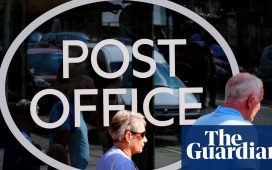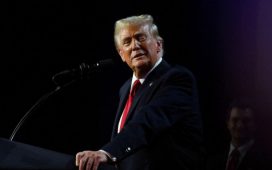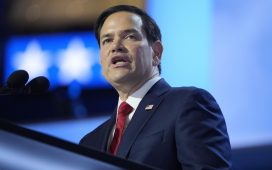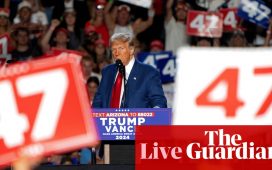Bob Carr weighs in on future of Aukus deal: ‘You get taken for granted’
The former NSW premier and Labor foreign minister Bob Carr is speaking with ABC RN about Aukus – and said he is not confident the deal is safe under a Trump presidency.
In fact, skepticism about it is is more widespread than is being admitted publicly in Canberra security circles and elsewhere.
Carr said that America is “engaged in a competition over boat numbers with China” and that its shipyards are “terribly constrained and are performing badly.”
We’ve reach a point – and it could be under Trump, it could be under the president who follows Trump – where a secretary of defence will say to the president, we simply cannot achieve [our] targets … and we can’t peel off from our order of battle attack class submarines that are needed in the competition with China to give to Australia. It’s almost inevitable that that is going to happen, and we will be offered a new view of Aukus, which means American attack class subs being stationed on a virtually permanent basis in Australia ports …
One of the prizes you pay for being such a compliant, non-argumentative ally is that you get taken for granted, and will be taken for granted on this when we are presented [with it] in a few years time … with a reinterpretation or re-weaving of the Aukus narrative.
Key events
South Australian premier suggests it is worth looking into lobbying reform
Asked if the South Australian government would also look at lobbying, Malinauskas suggested this was worth looking at:
I do think that reforms around lobbyists, what happens to MPs post their political life, I think these are question marks that are worthy of pursuit.
He said the state government had three objectives this term – to ban political donations, teach civics in school, and implement social media age limits.
These are the reforms we’re focused on in our first term and those other types of reforms we would love to have an opportunity to look at further into the future. I think this is necessary and we should probably talk about it as a country more than we do.
Malinauskas on plan to ban political donations from state elections
Earlier, South Australian premier Peter Malinauskas spoke with ABC News Breakfast about plans to ban political donations from state elections to everyone but newcomers.
The program reported he had found support from the Liberal party and the crossbench on this. Malinauskas said that people’s “confidence in democracy globally throughout the West is on the decline” and that Australia is not immune from this:
A contributing factor – not the only factor, but a contributing factor – is the sense that the democratic process is somehow divorced or out of reach of every Australian, and I think one of the things that informs that view is the idea that if you pay big money and you’re a donor to a political party, you somehow get access that others don’t.
We should remove that from the equation entirely, hence had the ambitious reform to take all donations out of politics – whether from unions, business or wealthy individuals – take it all out of the process so that we’ve got a relatively level playing field.
Malinauskas announced plans for the changes in June:
Funding boost to save endangered fish in remote harbour
Millions of dollars will be spent boosting water quality and environmental conditions in a Tasmanian waterway dominated by salmon farming to save the endangered Maugean skate, AAP reports.
Anthony Albanese has announced a $28m boost for new measures in Macquarie Harbour, including scaling up oxygenation to offset the effects of human activities on the endangered species.
About $5m of the funding will invested into skate breeding programs which hatch eggs and raise juveniles for release while environmental conservation efforts work to improve its habitat. Another $2.5m will go towards monitoring the skate population and compliance in the community.
There are an estimated 40-120 adult Maugean skates remaining in the wild, according to environmental campaigners. The government’s own conservation advice called for urgent action to eliminate or significantly reduce fish farming impacts on the harbour’s oxygen levels to help safeguard the skate.
A decision to increase the skate’s status to critically endangered was pushed back until after the federal election.
Victorian government announces tobacco licencing scheme

Benita Kolovos
The Victorian premier, Jacinta Allan, is announcing a tobacco licencing scheme for the state, which she says is the “toughest in the nation”.
Victoria is the only state without any kind of registration or licencing scheme in place, which has hampered police in their efforts to crackdown on the illegal tobacco trade. Police established taskforce lunar in October last year to stamp out firebombing and arson on tobacco stores, of which there have been more than 100 attacks.
Under the Tobacco Amendment (Tobacco Retailer and Wholesaler Licencing Scheme) Bill, to be introduced to parliament today, people will only be able to sell tobacco with a licence. A licence will only available for “fit and proper persons” who pass a strict test, and people can be refused a licence based on criminal history and known associates.
A new tobacco regulator will also be set up, with dedicated inspectors to enforce the scheme, which was a key request of Victoria police. The regulator will be given the power to search shops, suspend licences and seize illegal items, and can pass on intelligence to police.
Victoria police’s search powers will also be beefed up to make it easier and quicker to raid, search and seize illicit products from a retailer suspected of having links to organised crime.
Allan said the scheme will also be coupled with tougher penalties. People found to be selling illicit tobacco will face fines of more than $355,000 or up to 15 years in jail, while businesses will face fines of more than $1.7 million. She said:
This new strict new licensing regime includes more boots on the ground, more resources on the ground, more powers, particularly power for Victoria Police to crack down on the illicit tobacco trade. And there will be massive consequences, massive penalties for people who breach this regime. And these penalties are the toughest penalties in the nation.
Super Members Council calling for workers under 18 to be allowed super contributions
A new report from the Super Members Council has found that workers aged under 18 across the country could each have $10,000 more at retirement if an “outdated exclusion” denying them super contributions is abolished.
Currently, under-18s are denied compulsory super contributions unless they work more than 30 hours a week. The report found about nine in 10 teenagers do not reach the 30-hour work threshold each week – denying about 505,000 teenage workers about $368m in total super contributions a year.
Super Members Council CEO Misha Schubert said:
Australians strongly support universal super – and know it’s a workplace right. Super should be for everyone, paid from the first hour of your first job, and fixing this outdated exclusion is overdue.
As every smart investor knows, thanks to the magic of compound returns, a dollar invested early in life in super has the most power to grow our retirement savings exponentially over our lives.
SMC research shows 85% of Australians think anyone who does paid work should get super contributions.
‘Furious’ nurses won’t back away from day-long strike
More than 50,000 public nurses and midwives are perplexed by a seismic pay overhaul for police and will resist calls to back down from a 24-hour strike, AAP reports.
The female-dominated workforce demands a one-off pay increase of 15% to help address a gender pay gap in hospitals. A 24-hour strike and large rally are planned for Wednesday.
While the Labor government maintains the nurses’ claim would be unaffordable, it raised eyebrows yesterday when tabling a major pay deal for police. The offer would lift lower-ranked officers’ wages by an average of 26% over four years, making them the best paid in the nation.
Police deserved the boost but nurses had been “furious” to hear a “reasonable” offer had not also come their way, Nurses and Midwives Association NSW general secretary Shaye Candish said.
We’ve now seen the teachers, the police, paramedics, cleaners and administrative staff, special constables [get offers], the list grows. The biggest public sector, female-dominated workforce is being left behind.
The health minister Ryan Park said that “while I urge the Association not to proceed with this strike, NSW Health has begun contingency planning to mitigate risks to patients and the community.”
The government says its offer of 10.5% over three years is “fair” and comes after major boosts to workforce numbers and staff-to-patient ratios.
Rishworth responds to data showing three in five Australian renters expect to never own home
As Cait Kelly reports, new research from the Australian Housing and Urban Research Institute has found three in five Australian renters expect to never own their own home – a significant shift that requires rethinking of tax and housing systems, it said.
The social services minister, Amanda Rishworth, was on ABC News Breakfast earlier where she was asked about this, and responded:
Look, we want to see people have home ownership as an aspiration if that’s what they want. And that’s why our focus when it comes to housing is about putting more supply, building more homes … It’s something we are very much focused on. And of course part of that includes, for example, our shared home equity scheme – which has been blocked in the Senate by the Liberals and the Greens. So, look, we want to make home ownership an aspiration people believe they can achieve, and we’ll work towards that.
NSW government’s anti-protest laws have ‘chilling effect’ on social progress, group says
The NSW Council for Civil Liberties has labelled stronger sanctions for obstructing railways as “draconian” and argued growing protest laws “have created a chilling effect on civil movements and social progress.”
NSWCCL president Timothy Roberts said in a statement that the Council was formed in 1963 in response to a crackdown on peaceful protest by NSW police – and that these new laws from the Minns government “represent a return to dark and shameful days where the right to protest was curtailed, criminalised and where protestors were vilified in the press and arrested en masse”.
The introduction of another tranche of draconian anti-protest laws represents another betrayal of the public’s trust by those who should stand to strengthen and defend civil liberties … The Council will continue to fight for the right to protest and will stand beside peaceful protestors. It is shameful that NSW continues to refuse to introduce a state based human rights charter that would protect the right to protest.
Roberts argued that you “cannot arrest your way towards social cohesion” and you “cannot protect democracy by fundamentally restricting the cornerstone civil liberties that create it.”
This is the action of an unthinking premier who seeks only to pander to the right wing media, emboldened by those in his party who have demonstrated a lack of courage in not standing up, speaking out and demanding that fundamental civil liberties be protected – not just today, but tomorrow and for generations to come …
[The NSWCCL] calls on all sectors of civil society as well as members of the public to oppose the laws. Our efforts and campaigns for the right to protest must continue to be coordinated, diverse and fearless.
NSW government to introduce tougher penalties for railway protests
The New South Wales government has announced stronger sanctions for obstructing railways as part of illegal protests.
In a statement, premier Chris Minns and attorney general Michael Daley said new legislation would be introduced this week to implement a maximum fine of $22,000 for “obstructing a railway”.
The current offence provision under the Crimes Act does not specifying a fine. A fine would now be in place for those found guilty of obstructing a railway – or damaging or disrupting major facilities – or up to two years’ imprisonment, or both.
The statement said this would align with changes to laws in 2022 making it an offence to block or obstruct major roads, bridges and tunnels and major facilities like ports and railway stations. The statement continues:
Many of the recent protesters causing mayhem in the Hunter Valley were charged with obstructing a railway. This provision also covers people found to have assisted those who directly commit the offence.
By strengthening the penalty, this aims to deter extremely dangerous conduct that puts train driver, rail worker and passenger safety at risk. Blocking railway tracks disrupts commuters and commerce and diverts the precious resources of NSW Police.
The change would apply to every railway line in the state as well as light rails, the statement said.
Coalition ‘not contemplating’ walking away from net zero by 2050
The Liberal senator Jon Duniam said the Coalition remains committed to its net zero commitment by 2050.
We’ve said we remain committed there, and we are going to continue to do things that are in our interests, not necessarily follow suit with the United States. There are some things they do which makes sense, there are others which are suited to them and not to Australia.
Several Nationals backbenchers have suggested Coalition support for net zero by 2050 should be reconsidered, and Senator Matt Canavan has said Australia should withdraw from the Paris agreement. But Duniam said the Coalition’s key policies were not being reconsidered:
We are currently committed to, and as far as I’m aware, remain committed to net zero by 2050 – that’s not the policy in question.
What we need to do is, while we seek to do what we can to achieve those goals, which – including this government, doesn’t seem to be occurring too positively – is ensure that Australians don’t pay inordinate amounts of the things they need to do every day – electricity, getting about in their vehicles, so making sure that the goods so bad at the supermarket are not at increased cost.
So there are a range of things we need to do there, but walking away from net zero as a standalone policy is not something that we are contemplating.
Coalition environment spokesperson touts cheap energy when asked about Trump’s climate policies
The Coalition’s environment spokesperson, Jon Duniam, was also up on ABC RN this morning to discuss net zero policy. Host Steve Cannane asked him:
Donald Trump has signalled he’s looking to repeal Biden’s signature climate law, pull out of the Paris Agreement, get rid of many of the Biden administration’s regulations intended to cut carbon emissions, and essentially, drill baby drill. Will the Trump presidency be good for the world’s environment?
Duniam responded by talking about the benefits of cheap energy:
Having cheap energy so that countries can come out of developing status into developed is as important as protecting the environment. I don’t think necessarily the two are mutually exclusive.
I think that there are a great many innovators in the US who continue to innovate, despite the change of government, change of policy direction, and have improved technologies that improve outcomes for the environment. I don’t think necessarily Donald Trump being elected to the White House means we are going to see a downward trajectory in environmental outcomes.
Carr urges Albanese government to recognise Palestinian statehood by next federal election
Moving to the Middle East and what a second Trump presidency means for this, Bob Carr said he doesn’t see Trump retreating from the alliance between Israel and the US.
I think the wily fox Netanyahu is going to win this one. [He] will be able to continue this ruinous war and inhumane war in Gaza without the threats coming from an American president that he will be penalised with a loss of military supplies.
Carr has previously said he wants the Albanese government to recognise Palestinian statehood before the next federal election. Asked about this, he told ABC RN it’s “the right thing to do”:
It sends a message to the Palestinians that there can be hope if they adhere to a peaceful path to negotiated statehood and avoid the temptation, in desperation and despair, to support the murderers of Hamas … It also sends a message to Israel that what you are doing in Gaza – in destroying 80% of the housing of the people, in allowing terrible atrocities … in denying medicines to the hospitals and clean drinking water to a population being forced to evacuate towns over and over again to avoid bombing – what you’re doing there is intolerable [and you will] lose the support of a country like Australia as a result of pursuing such policies.
Carr argued the Albanese government could end up in a minority government if it doesn’t recognise Palestinian statehood:
Then, it’ll be taunted with only moving because it came under cross bench pressure, or if worse – Labor went into opposition – it can have no reputable dialogue with Arab background Australians and others who, for different reasons, support recognition of Palestine, given that we didn’t move when we had the power to move on this.
Carr says ‘militarisation’ of northern Australia has happened with ‘scandalous lack of consultation’
Bob Carr was also asked about the statement from the former PM Paul Keating, suggesting the Albanese government is out of touch with the Australian public on foreign policy matters.
Carr said in his view, the “militarisation” of northern Australia has “taken place with a scandalous lack of consultation with the Australian people”.
It’s quite striking given the weight of anti Chinese commentary that’s dominated the Australian media in the last eight years, but you’ve got 57% of the population – according to the Resolve Political Monitor poll – … who agreeing with the proposition that Australia should avoid taking sides in a US-China conflict. Only 16% are taking a contrary view …
Australian diplomacy should be quietly working, not only with America and with China, but with partners in Asia, Japan and India, towards the notion of a detente between America and China. If you’re able to build areas of cooperation and reduce areas of adversarial conflict between the Soviet Union under Leonard Brezhnev and the United States under Richard Nixon and later under Ronald Reagan, it’s not this bigger task to aspire to increasing areas of cooperation and diminishing areas of conflict between China and the US, and that ought to be a goal of Australian diplomacy.
Bob Carr weighs in on future of Aukus deal: ‘You get taken for granted’
The former NSW premier and Labor foreign minister Bob Carr is speaking with ABC RN about Aukus – and said he is not confident the deal is safe under a Trump presidency.
In fact, skepticism about it is is more widespread than is being admitted publicly in Canberra security circles and elsewhere.
Carr said that America is “engaged in a competition over boat numbers with China” and that its shipyards are “terribly constrained and are performing badly.”
We’ve reach a point – and it could be under Trump, it could be under the president who follows Trump – where a secretary of defence will say to the president, we simply cannot achieve [our] targets … and we can’t peel off from our order of battle attack class submarines that are needed in the competition with China to give to Australia. It’s almost inevitable that that is going to happen, and we will be offered a new view of Aukus, which means American attack class subs being stationed on a virtually permanent basis in Australia ports …
One of the prizes you pay for being such a compliant, non-argumentative ally is that you get taken for granted, and will be taken for granted on this when we are presented [with it] in a few years time … with a reinterpretation or re-weaving of the Aukus narrative.








